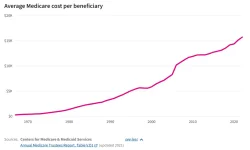Of those I am familiar with, it is perhaps the most. I have been given to understand Switzerland has a not-terribly blended system

, but, none of those nations are the U.S., with the U.S. government, or the U.S. population. A system that works very well for a small, homogenous population that generally eats healthy and exercises, has a relatively efficient and non-bloated/corrupt government, and doesn't get
millions of people from mostly poorer nations flooding in both legally and illegally every year..... may work very poorly here.
Even among Bernie Sanders supporters,
a majority are unwilling to pay additional taxes in order to have single-payer healthcare.



